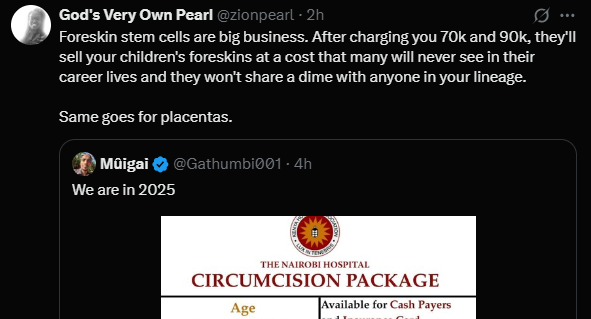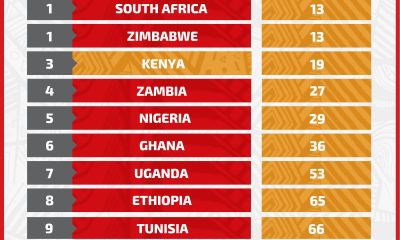News
The Nairobi Hospital Faces Backlash Over 90,000 KES Circumcision Advertisement
A promotional poster from a leading private healthcare facility has ignited a fierce online debate in Kenya, highlighting deep-seated tensions between modern medical practices, cultural traditions, and the country’s vast economic disparities.

ALSO READ: Kenyan Activists Claim Ugandan Soldiers Wore Kenya Police Uniforms During Gen Z Protests
The controversy began when a poster from The Nairobi Hospital, advertising a “Circumcision Package” for boys aged 7 to 13 years at a cost of 90,000 Kenyan Shillings (approx. $690 USD), went viral on the social media platform X. The package, which includes general anesthesia and private care, was presented as a premium medical service for the rite of passage.
The online reaction was swift and critical, with many Kenyans using the post to underscore the extreme contrast in healthcare costs. Users were quick to point out the existence of heavily subsidized county government programs that offer the procedure for around 2,000 KES, and the long-standing traditional rituals in rural areas, which can cost as little as 300 KES.
The discourse quickly moved beyond price shock to address broader societal issues. Many commentators criticized the commercialization of a cultural rite of passage, arguing that it was being transformed from a communal event into an exclusive, luxury commodity.
“The conversation isn’t just about the price tag; it’s about what we value as a society,” one social media user commented. “When a hospital charges more for a circumcision than many Kenyans earn in a year, it forces a conversation about equity and the direction of our healthcare system.”
The online furor also veered into the realm of conspiracy, with unsubstantiated theories circulating about the potential resale of foreskins for biomedical research and cosmetic products. While baseless, these claims added fuel to the fire, reflecting underlying public anxieties about the ethics and motives of modern medical institutions.

The viral episode serves as a microcosm of the ongoing tensions in a rapidly modernizing Kenya, where advanced, private medical services coexist with deeply rooted communal traditions and a public struggling with the high cost of care. The Nairobi Hospital’s advertisement, intended for a specific clientele, inadvertently became a national referendum on the widening gap between the affluent and the average citizen, and the complex interplay between culture and commerce.
As of press time, The Nairobi Hospital had not issued a public statement regarding the online controversy. The discussion, however, continues to resonate across the country, prompting a necessary, if uncomfortable, examination of healthcare accessibility and the preservation of cultural identity.
Follow us on X
-

 Education2 days ago
Education2 days agoKNEC Officially Opens 2025 KCSE Results Checking System
-

 Nairobi5 days ago
Nairobi5 days agoKenya’s Top 10 Wealthiest Individuals: Business Empires Spanning Key Economic Sectors
-

 Education4 days ago
Education4 days agoStudy Confirms Kenya’s Position as Africa’s Third-Best English-Speaking Nation
-

 Laikipia1 week ago
Laikipia1 week agoOfficer Offs Colleague at Laikipia Police Post
-

 Education2 days ago
Education2 days agoHow to Check Your 2025 KCSE Results Online: Step-by-Step Guide to KNEC Portal Access
-

 Nairobi5 days ago
Nairobi5 days agoKenyans React as List Names 10 ‘Best Tribes to Marry Women From’ Goes Viral
-

 Education2 days ago
Education2 days agoCS Ogamba Releases 2025 KCSE Results: 993,226 Candidates Sit Exams, 1,932 Score Grade A
-

 Murang'a3 days ago
Murang'a3 days agoMurang’a Pastor Collapses Minutes Before Completing 80-Hour Tree-Hugging Record Attempt
























